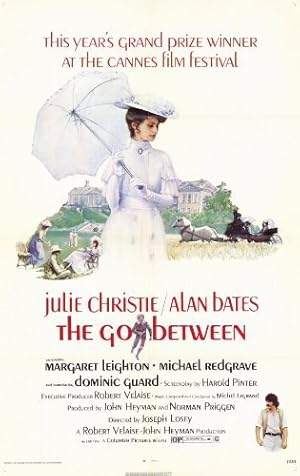
The Go-Between Page #4
- GP
- Year:
- 1971
- 116 min
- 241 Views
They're all grown up, you see.
Except Marcus.
He's in bed.
Marian talks to me. Miss Marian.
Ah, does she ?
She talks to me most.
- When her hair was wet...
- Are you ever alone with her ?
I mean just the two of you in
a room with no one else.
Well, sometimes.
Sometimes we sit together on the sofa.
On a sofa ?
Could you give her a letter ?
Without anybody else seeing.
Of course I could.
But can I trust you ?
To keep your mouth shut ?
Because, you see...
It's a secret.
All right ?
I'll trust you.
There.
- Is this his ?
- Yes.
He said he wouldn't want it back.
Shall I throw it on the rubbish dump ?
Oh, I don't know.
Perhaps I'll wash it out.
Seems a quite good handkerchief.
Wait.
He asked me to give you this.
It's a bit crumpled.
This dress is.
Now, the bandage.
You've put it on.
Oh, yes.
Now I'll put on your stocking.
- I can do that.
- No, no. I'll put it on.
You won't tell anyone about
this letter, will you ?
You wouldn't, would you ?
Of course I wouldn't.
There.
Shall you be going to Goodworth ?
I think I shall go to Goodworth.
Shall you ?
Yes.
Are you referring to Gussy Tom ?
- Gussy Tom... ?
- Hello. There's Mercury.
Why do you call him Mercury ?
'Cause he takes messages.
You took your message for me,
didn't you, old child ?
To this young lady here on
the way from church.
You didn't fetch a very warm response.
Do you know who Mercury was ?
Mercury is the smallest of the planets.
Ah, but before that he was
the messenger of the gods.
He went to and fro between them.
Do you know Ted Burgess ?
Ted Burgess ? We all know
Ted Burgess.
He's a bit of a lad, Ted Burgess.
What do you mean by a lad ? I should
have said he was a full grown man.
Enjoying yourself ?
Oh, yes thank you, sir.
Miss your mother ?
Yes, sir.
I mean, no, sir.
A little, sir.
Pretty hot today.
Is it a record ?
I shouldn't be surprised.
I'll have to look it up.
- Hot weather suit you ?
- Yes, sir.
Hi ! Mercury !
Come here. I want you.
Trying to sneak past in dead ground.
Where were you off to ?
Nowhere.
Ah, nowhere. Well, would you
like to go somewhere ?
Yes, where ?
It's up to you.
I want you to find Marian.
We need her to make a four at croquet.
No idea where she is.
Can you find her ?
- I don't know.
- Well, no one else could.
But you can.
- Will you do that ?
- Yes.
You must bring her back
dead or alive.
What are you doing here ?
- Hugh asked me to find you.
- Why ?
He wants you to play croquet.
He said I was to bring you
back dead or alive.
Well, which am I ?
I'm going to luncheon with some
neighbors tomorrow.
They're very old and mossy. I don't
Translation
Translate and read this script in other languages:
Select another language:
- - Select -
- 简体中文 (Chinese - Simplified)
- 繁體中文 (Chinese - Traditional)
- Español (Spanish)
- Esperanto (Esperanto)
- 日本語 (Japanese)
- Português (Portuguese)
- Deutsch (German)
- العربية (Arabic)
- Français (French)
- Русский (Russian)
- ಕನ್ನಡ (Kannada)
- 한국어 (Korean)
- עברית (Hebrew)
- Gaeilge (Irish)
- Українська (Ukrainian)
- اردو (Urdu)
- Magyar (Hungarian)
- मानक हिन्दी (Hindi)
- Indonesia (Indonesian)
- Italiano (Italian)
- தமிழ் (Tamil)
- Türkçe (Turkish)
- తెలుగు (Telugu)
- ภาษาไทย (Thai)
- Tiếng Việt (Vietnamese)
- Čeština (Czech)
- Polski (Polish)
- Bahasa Indonesia (Indonesian)
- Românește (Romanian)
- Nederlands (Dutch)
- Ελληνικά (Greek)
- Latinum (Latin)
- Svenska (Swedish)
- Dansk (Danish)
- Suomi (Finnish)
- فارسی (Persian)
- ייִדיש (Yiddish)
- հայերեն (Armenian)
- Norsk (Norwegian)
- English (English)
Citation
Use the citation below to add this screenplay to your bibliography:
Style:MLAChicagoAPA
"The Go-Between" Scripts.com. STANDS4 LLC, 2024. Web. 7 May 2024. <https://www.scripts.com/script/the_go-between_20325>.


Discuss this script with the community:
Report Comment
We're doing our best to make sure our content is useful, accurate and safe.
If by any chance you spot an inappropriate comment while navigating through our website please use this form to let us know, and we'll take care of it shortly.
Attachment
You need to be logged in to favorite.
Log In